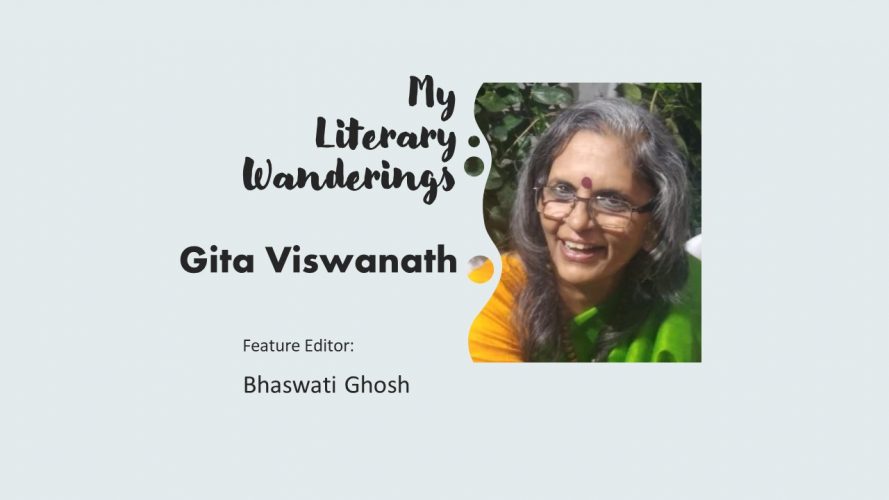The year was 1965. My dad came home from office with a huge, brown paper packet in his hand. Out of it came Cinderella, a hard-bound book measuring 2 ft by 1.5 ft. I sat with it speechless. Turned and turned over the pages again and again, ignoring my mom’s calls for dinner. Kept staring at the pictures and read as many words as I could decipher. Even before I had read the book, strangely, I recall wanting to write something, anything that would take the form of a large book. With the mere desire to write, my journey as a writer had begun. From then on, everything seemed to feed into this desire. From asking my dad why he laughed so much while reading The Pickwick Papers to waiting eagerly for the weekly issue of Andhra Prabha from which my mom read out stories, to eavesdropping on my neighbours, teachers, relatives – everything around me seemed to be filling up a bucket in my head that would ultimately be the vessel I would draw from in order to write.
Letters would be my earliest forays into creative expression. Being the only family outside our hometown, we had a large extended family in Bangalore and Gownipalli, a village in Kolar district of Karnataka. The latter would go on to become Gajulupur, the fictional village in my novels. Grandparents, uncles, aunts and cousins were all subjected to my weekly outpourings about how petrified I was of math, how much I loved my geography teacher, how I had watched with glee earthworms wriggling when I poured salt on them (surely a cruel kid), how I could skip rope non-stop to the count of hundred, so on and so forth. The games we devised, I now realise, provided immense scope for flights of imagination as well as for building a sharp sense of observation that ultimately would lead to the capacity for conjuring metaphors. There was one game, I recollect, in which we had to come up with comparisons of food with non-food items. I made a qualmish friend of mine stay off sabudana kheer for life by calling it chicken pox kheer!
A weekly period in school dedicated to Composition went a long way in honing my writing skills and helping me appreciate the elegance of writing. The primness of my convent school teachers extended to fastidiousness in grammar. Writing ‘none of them were’ or ‘one of the girl’ were unpardonable sins that could only be expiated through a punishment called Imposition in which we had to write, ‘I will never write ‘none of them were’ a hundred times!
For years, I suffered from what I choose to call the ‘halo effect,’ leading to writing and tearing. By the time I was twelve, I knew The Mahabharat and all its subplots and innumerable back stories. Could any writing ever rival that grandest of family stories? Anything I wrote and read to myself would elicit the response, ‘nowhere close to the Pandavas-Kauravas story, not even to Pearl Buck/Lawrence/Marquez/Steinbeck/Allende and the like,’ until one fine day a professor of mine said, ‘Stop being arrogant and simply write.’
After harbouring a story in me for several decades, incidentally about families, I finally picked up the courage to put pen to paper. I stopped reading for a year and just wrote and wrote. Gingerly at first, steadily after a while and then like there was no tomorrow. I drew on stories I had heard about people I knew, I invented personalities for them, put them into tough situations and moral dilemmas, all the while with the ultimate aim of telling a gripping tale with compassion, not judgement towards the characters who had taken up residence in my consciousness. I believe every writer has to be schizophrenic in a way. Learning to live comfortably with multiple personas in our heads is not an occupational hazard but a necessity. After all, if you don’t nurture and love your characters, how can you make your readers love them?
The most excruciating part of a writer’s life is to learn of the rejections of your creation. The mandatory 90-day wait that every publisher puts a writer through is a period of intense anxiety, restlessness and feverish impatience. And surely and steadily, they arrived. One after another; some in the form of no response at all, meant to be taken as rejection, some swearing they enjoyed reading the sample chapters (then why reject, I wanted to scream) but they didn’t fit the bill for them. It seemed to me like one didn’t like the shape of my baby’s nose, another would have loved it if only it had more hair on its head and still another wanted a chubbier version; mine was too thin. Even a couple of agents rejected my work as not being market-friendly enough. One of them sent me a detailed review, a particularly vicious one that seemed not to find a single virtue. I was broken. How could they not like my story about the secrets women carry? How could they not recognize the unique narrative style in which a dead woman narrates her story on her 13-day journey to the other world? How could they not be fascinated by my unreliable narrator who ends up in an asylum? My early fear, the halo effect, seemed the perfect reason for my not writing all these years. I went back to reading, feeling elated at the stray publication of a poem or an essay.
Finally, the novel Twice it happened found a home. It certainly didn’t create a storm but I did manage some good reviews and decent readership. However, what it taught me was to keep on telling stories as earnestly as possible. There is no substitute for discipline. Waiting for the muse is a myth, I learned. The good old method of writing a page a day is a more productive one. Also, even if one baby is rejected, the next needn’t be. So long as there are stories to be told, and yes, they skulk in every corner, keep on writing, I told myself. Following this method surely didn’t take me twenty years to write the second novel nor that much time to gain acceptance for it. The clock hasn’t struck twelve yet!
********************
Gita Viswanath is the author of two novels; Twice it Happened (2019) and A Journey Gone Wrong (2022), a non-fiction book, The ‘Nation’ in War: A Study of Military Literature and Hindi War Cinema (2014) and a children’s book, Chidiya (2016). She has also published poems, short stories and essays in journals and anthologies. She is the co-founder of an online film club called Talking Films Online.
*









Add comment